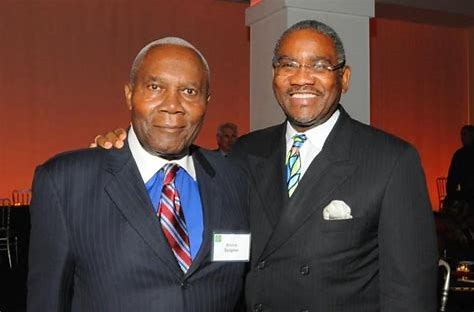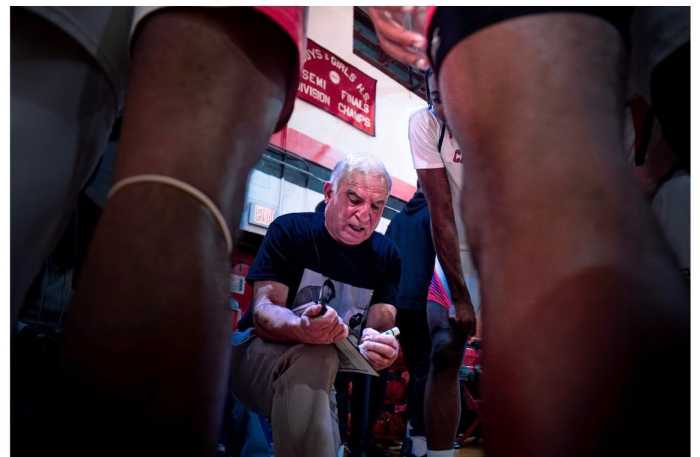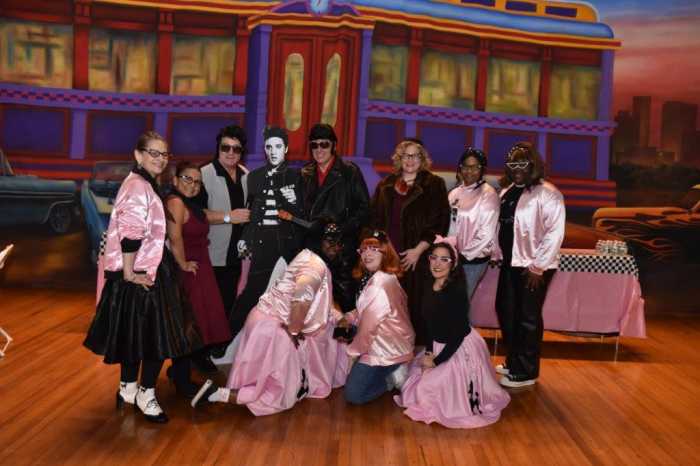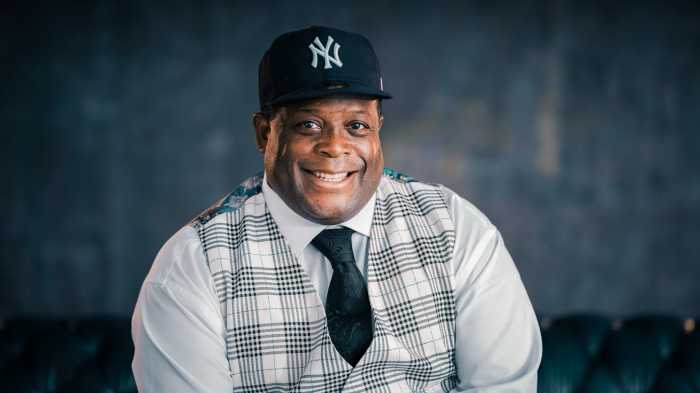BY JAY HERSHENSON
There is a large sign above the door of the Guy R. Brewer United Democratic Club in St. Albans, where Queens College alumnus, Class of ’72, and District Leader Archie Spigner regularly holds court. It says, “Barack OBAMA for President.” One cannot easily envision this meeting hall filled with red “Make America Great Again” hats, but it would come as no surprise if someday a new first name, like “Michelle,” appeared on that sign.
Inside the club is a recently painted, deceptively large, corner meeting hall. On Dec. 18, 2019, Spigner sat attentively at a table for about 90 minutes. He nursed his coffee to supplement the modest heating system, and reminisced about his 91 years of experience.
It began in the town and nearby farmlands of Orangeburg, S.C., where Spigner, the last of five kids, was born on Aug. 27, 1928 — a birthday he shared with the late President Lyndon Baines Johnson. If you believe in numerology, then know that later on in his life, Spigner represented the 27th Councilmanic District for, you guessed it, 27 years (time to bet that number!).
“To say we were a struggling black family is to put a good face on it,” he said, noting that he was always hungry as a child, and that he loved the way his aunt, a school teacher, made sweet potatoes.
The family moved in shifts to the northeast in the late 1930s and beyond, some members living with relatives in Stamford, Conn., and others staying behind on a farm. Spigner migrated to Harlem, then to the Bronx, and finally, to southeast Queens.
Along the way, he picked up loose change shining shoes, helping out in local barber shops (“dust the guys off and they would give you a nickel or dime.”). He would get married, then go on to work in a shoe factory, a bakery, and as a bus driver, juggling employment with raising a family. He displayed the skills, fortitude and persistence of a street savvy, transplanted southerner. His number one hero was Joe Louis, the great heavyweight boxing champion.
Spigner enrolled in Central Needle Trades High School (a “fashion high school”, he calls it) in Manhattan, graduating in 1947. He joined its co-op program and went to work in a shoe factory, no different than the average sweat shop at the time. At the suggestion of a co-worker, he enrolled in the Jefferson School of Social Science, a prominent left-wing institution where he learned parliamentary procedure—still one of the anchors of politics. He became the factory shop steward and thus began his long association with labor and organizing.
Leaving the garment trade, Spigner became a New York City bus driver and in the mid-1950s, he joined the Negro American Labor Council founded by the late great labor leader, City College alumnus A. Philip Randolph. Spigner organized the Queens Branch of the Negro American Labor Council. He had been traveling to Harlem from Queens for meetings, but there was enough of a critical mass to merit a Jamaica presence.
He held the first meetings in his living room in Queens, “even before I had furniture,” he recalls. He assumed the role of secretary or assistant secretary. “I’m a joiner,” Spigner has said. “That’s what I am, I’m a joiner, and I became a volunteer. Who’ll take the minutes? I’ll take the minutes!”
One night, Spigner met the late Kenneth N. Browne, an assistant district attorney, at Fuzzy’s on Linden Boulevard. Browne was running for the New York state Assembly. After Spigner asked, “You need some help?,” Browne invited him to the local Democratic Club. There, he met legendary district leader Guy R. Brewer, who asked Spigner to help organize some new troops to gather petition signatures to help Browne qualify for the ballot. Browne won the election.
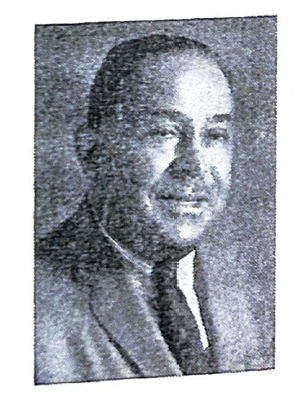
Brewer was working as the liaison to the African-American community for Queens Borough President Sidney Leviss. Subsequently, Browne became a civil court judge and Brewer won the vacated Assembly seat. Brewer was obliged to give up his district leader position because he could not hold it simultaneously with the legislative seat. He asked Archie to become district leader and Spigner moved into Borough Hall to take Brewer’s place there. The musical chairs were humming.
“When I met people like Guy Brewer and Ken Browne, I recognized that I needed some (more) education,” Spigner said.
He enrolled in classes at St. Monica’s Church in Jamaica — where York College stands today — to strengthen his academic skills. He was admitted to an associate degree program at Queens College in the mid-1960s, earned a bachelor’s degree in political science from QC in 1972 and went on to pursue graduate studies at the college. (Spigner is particularly proud of his several family members who graduated from Queens College.)
In 1974, the New York City Council was expanded from 35 to 51 members. Tired of trekking to Albany, Brewer wanted to join the Council and have Spigner replace him in the Assembly. Spigner demurred. The Democratic Club’s board of directors voted — by secret ballot — to resolve the dispute. Winning by one vote, Spigner went on to become a City Councilman and then deputy majority leader, appointed by Speaker Peter Vallone. During his 27-year tenure, Spigner chaired the Committees of Housing and Buildings, and Economic Development, and the Legislative Office of the Budget Review. A two-term limit was imposed on Council members in a 1993 referendum and, subsequently, Archie left the City Council.
On May 6, 2005, Borough President and Queens College alumna Helen Marshall — many credit Spigner for securing her nomination by the Queens County Democratic Party — proclaimed “Archie Spigner Day” boroughwide. At a ceremony that day, federal officials renamed a United States Post Office in St. Albans in his honor. Congressman Gregory Meeks authored the bill. It passed both the House of Representatives and the Senate and was signed by President George W. Bush. At the event in Queens, Senator Charles Schumer thanked Spigner and his club for strongly supporting him when he ran against Alfonse D’Amato for the United States Senate.
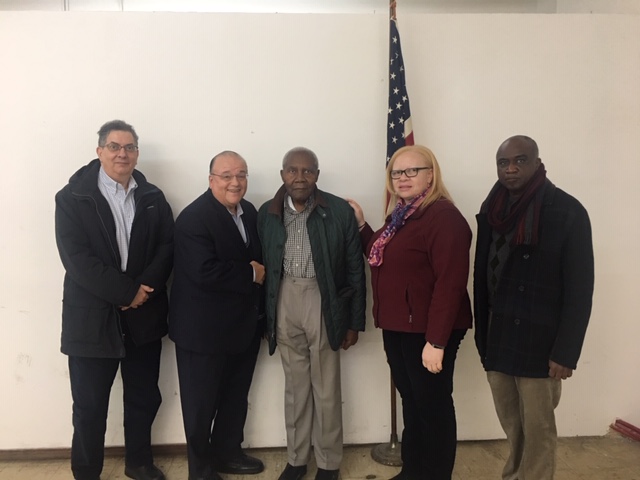
“All of us stand on Archie’s shoulders,” said Schumer, who, according to reporter Amy Lotven, credited Spigner with advancing the election of the first African-American state senator, congressman, New York City mayor, borough president, and county Supreme Court judge.
“David Dinkins would not have been mayor if it was not for Spigner,” former Manhattan Borough President Percy Sutton reportedly stated.
Many there would have surely attested to Spigner’s longstanding advocacy for York College, including a key meeting he organized with Governor Hugh L. Carey and community leaders at a critical stage in the process to help ensure the building of the current campus in Jamaica.
At another occasion, New York state Senator Leroy Comrie spoke about Archie, his longtime mentor and close friend. He stated, in part, “Archie is a person that has a keen sense of the dynamic of a situation. He does his homework and is never underprepared. He’s willing to listen to reason. He loves to debate. He loves to write and truly loves the city. . . . He has worked hard for equality to ensure that all are given equal treatment. . . . He has never backed away from an issue in which he has believed.”
Still smarting a bit about the imposition of term limits — especially the fact that if you run for office without first obtaining educational credentials, you can find yourself left out in the cold when your final term concludes — Spigner had advice for young people. “Get a degree in accounting or some other kind of degree.”
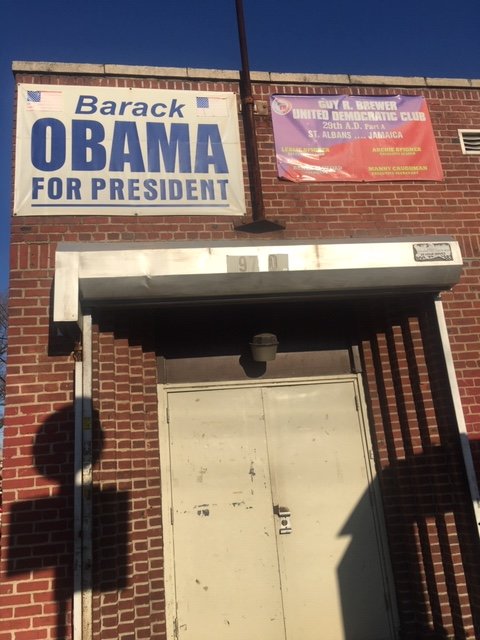
Speaking of the cold, outside the Guy R. Brewer United Democratic Club, next to the large “Barack OBAMA” sign above the door, is a smaller sign. It includes Archie Spigner as its district leader. The sign is a reminder that in Spigner’s universe, another election is always around the corner. The March 2020 special election for Queens Borough President, to fill the vacancy caused by Melinda Katz’s election as Queens District Attorney, is heating up. This corner meeting place will be humming again.
Jay Hershenson, Queens College’s Vice President for Communications and Marketing and Senior Advisor to the President, conducted an interview with Archie Spigner with the technical assistance of the LaGuardia and Wagner Archives of LaGuardia Community College. Special thanks to Director Richard Lieberman, Deputy Director Soraya Ciego-Lemur, Assistant to the Director Stephen Weinstein and Videographer Brandon Calva. Background materials from the Archives were helpful to the preparation of this article.

